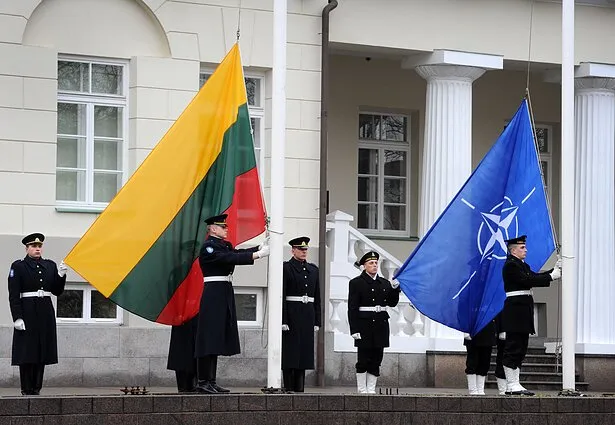-
CENTRES
Progammes & Centres
Location
Against the critical security backdrop and Kyiv’s counteroffensive, the NATO leaders will assemble for the upcoming summit in Lithuania

The Russia-Ukraine conflict has strengthened transatlantic unity and NATO’s raison d’être. Against this critical security backdrop and Kyiv’s counteroffensive, the NATO summit will take place in the Lithuanian capital of Vilnius on 11-12 July. Five key issues will dominate the summit.
As far back as the Riga NATO summit in 2006, member states had pledged 2 percent of their GDP towards defence spending, which only a few lived up to. The issue reignited during Donald Trump’s American presidency when he accused European nations of free-riding on American cash for their security. However, it was in the context of the Russia-Ukraine conflict, which is transforming Europe’s approach to security, that these pledges acquired new meaning and several reiterations, not least by previously pacifist nations like Germany.
The Vilnius summit now aims to discuss more ambitious defence targets. But the difficulties in balancing increased defence spending with rampant inflation and the already heavy cost of supporting Ukraine means that NATO members may continue to falter in this context.
Yet while Poland aims to reach the 4-percent mark and the Baltic states of Estonia, Latvia, and Lithuania have committed 3 percent, only seven out of the 31 NATO members currently meet the 2-percent defence pledge. NATO Secretary General Jens Stoltenberg recently emphasised that the 2-percent target is a minimum—“a floor rather than a ceiling”. The Vilnius summit now aims to discuss more ambitious defence targets. But the difficulties in balancing increased defence spending with rampant inflation and the already heavy cost of supporting Ukraine means that NATO members may continue to falter in this context.
The most heated debates will take place around the issue of Ukraine’s post-war security guarantees and NATO membership. In September 2022, in the backdrop of the crisis, Ukraine officially applied to join NATO. However, the alliance is divided on the issue—while Central and Eastern European states are pushing for Ukraine’s NATO membership given the country’s proven military prowess in fighting Russia; others such as the United States (US) and Germany are wary of repeating the 2008 Bucharest Declaration where future membership was agreed upon in principle but without any concrete follow-up. Yet others such as the United Kingdom (UK) and France are in favour of a fast-tracked route to Ukraine’s NATO membership by removing the Membership Action Plan (MAP) prerequisite.
There is consensus on Ukraine not joining NATO until the war ends—something that Ukrainian President Volodymyr Zelensky too accepts—since membership in the midst of a war would require the alliance to apply Article 5 with its enshrined principle of collective defence. Yet member states are expected to come up with proposals for post-war security guarantees for Ukraine. For starters, the NATO-Ukraine Commission, established in 1997, is likely to be upgraded to a NATO-Ukraine Council, to bring Ukraine closer to NATO. However, with serious divisions among NATO members, achieving consensus on security guarantees while satisfying Zelensky who is seeking concrete political signals, will be no easy feat.
A new Strategic Concept was adopted at the last NATO summit in Madrid in 2022 to strengthen NATO’s defence and deterrence capabilities ranging from collective exercises, combat forces, and command structures to cyber and space resilience and enhancing the alliance’s ability to defend the Eastern flank. A year later, the Vilnius summit provides an opportunity to evaluable the extent and success of implementation. Plans to manufacture more defence materials and accelerate collective industrial capacity are also likely to be on the agenda.
Another issue that will dominate the Vilnius agenda is Sweden’s bid for NATO membership. In May 2022, only a couple of months into the Ukraine crisis, Sweden and Finland applied for NATO membership, overhauling centuries of neutrality. Yet while Helsinki joined the alliance in April this year, Stockholm’s accession bid continues to be blocked by Hungary and Türkiye.
The EU has enough tools at its disposal, including recovery funds worth at least 28 billion euros, to lure Budapest into ratifying Sweden’s accession. However, the more stubborn opposition is from Türkiye, which holds the second largest army in the alliance after the US and wants Sweden to adopt a tougher stance towards Kurdish terrorist organisations that are threatening Ankara’s security. Hopes that President Erdogan’s re-election in Türkiye would ratify Sweden’s bid were dashed when provocative Islamophobic demonstrations and anti-Türkiye protests were allowed in the name of free speech in Sweden.
In the build-up to the summit, US President Joe Biden recently hosted Swedish Prime Minister Ulf Kristersson in an indication of American support for Swedish accession. Some experts allege that Türkiye’s grievances against Washington including the refusal to extradite Muslim cleric Fethullah Gulen deemed responsible for the attempted coup in 2016, and the US Congress ban to sell F-16 jets to Ankara, are motivating its objections to Sweden’s NATO accession.
As mentioned in the 2022 Strategic Concept, NATO countries are increasingly wary of China and have linked security in the Euro-Atlantic with security in the Indo-Pacific region. This points to a recognition that security challenges are no longer confined to a single geographical theatre, also spurred by China’s intensifying relationship with Russia and their “no limits partnership”. Thus, as with the 2022 summit in Madrid, NATO’s Indo-Pacific partners (IP4) including Japan, Australia, New Zealand, and South Korea, have been invited to Vilnius to bolster cooperation. NATO is currently preparing an Individually Tailored Partnership Programme (ITPP) with each of the four countries and is also considering opening a liaison office in Tokyo.
NATO countries are increasingly wary of China and have linked security in the Euro-Atlantic with security in the Indo-Pacific region.
NATO Secretary General Jens Stoltenberg, who has led the alliance since October 2014 with his term already extended three times before, will continue his tenure for another year despite his wish to step down. The alliance has remained divided on a suitable candidate to succeed the former Norwegian prime minister in the run-up to the Vilnius summit. Potential candidates included UK Defence Secretary Ben Wallace, Estonian Prime Minister Kaja Kallas, Danish Prime Minister Mette Frederiksen, European Commission President Ursula von der Leyen, and Spanish Prime Minister Pedro Sanchez. For now, it looks like Stoltenberg is here to stay, making this a non-issue at the summit.
With lots of ground to cover, developments at the Vilnius summit will likely be followed by folks across the globe. Certainly, Moscow and Beijing will be watching closely.
Shairee Malhotra is Associate Fellow with the Strategic Studies Programme at the Observer Research Foundation.
The views expressed above belong to the author(s). ORF research and analyses now available on Telegram! Click here to access our curated content — blogs, longforms and interviews.

Shairee Malhotra is Associate Fellow, Europe with ORF’s Strategic Studies Programme. Her areas of work include Indian foreign policy with a focus on EU-India relations, ...
Read More +